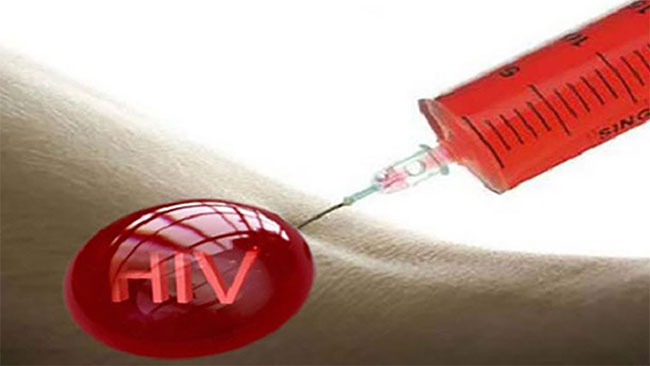In what ways is HIV transmitted?
The HIV virus is transmitted through 3 main routes: blood, sex and mother-to-child transmission.
HIV is a virus that causes immunodeficiency in humans . AIDS is the final stage of HIV infection. During this period, the body's immune system is weakened so patients are more susceptible to diseases such as infections, cancer . leading to death. There is no medicine to cure HIV.
According to Dr. Hoang Hong Van, Viet Duc Friendship Hospital, HIV symptoms are difficult to identify. There are periods when the patient has no symptoms, this condition can last for years. Most cases of HIV infection do not know the exact time when they are infected, do not know the source of infection for themselves. Many cases can only be diagnosed by a test. By the time of AIDS transfer, the patient showed signs of thinness, fever, headache, cough, appeared many diseases such as cancer, pneumonia, tuberculosis, dermatitis, body sores. Patients quickly die depending on the process of care and treatment.

There is no medicine to cure HIV.(Photo: Health).
Ways of HIV infection
Blood sugar
Direct blood transfusion from people with HIV to normal people is the fastest way to spread HIV. However, this case is very rare because before taking blood, it is necessary to go through the test to see if it is eligible for transmission. Normally, HIV is transmitted through joint use of uninfected infected needles properly, especially among injecting drug users. HIV virus is in the blood of patients, when injecting needles, containing HIV-infected blood. After this needle is not cleaned, it will be injected to another person, leading to the transmission of the virus.
Sex
This is the most common mode of transmission in the world. People who carry the HIV virus when having sex will spread it to their partners. HIV infection rate for each unprotected relationship is estimated at 0.1% to 1%. This rate will increase with the frequency of relations. Sex with condoms is still at risk of HIV infection, but the rate is much lower. Condoms increase safety by up to 90-95% if practiced properly.
Oral sex is less likely to spread the disease. However, if the mouth is scratched or bleeding without knowing it, HIV can still spread the disease.
Transmission from mother to child
Mothers with HIV infection give birth with 30% of the possibility of infection due to receiving nutrition through the placenta, blood . Testing should be performed at 6-12 months of age after birth, at this time, the baby's blood is no longer kept Mother's antibodies.
The age of HIV-positive children lasts only about 3 years.
Roads not infected with HIV
- Mosquito bites : HIV virus does not live and reproduce in mosquitoes. Mosquitoes only cause malaria, dengue fever .
- Kiss : The composition of body fluids such as saliva of people with HIV has only a very small amount of virus, not enough to destroy the human body.
- Common contacts : HIV virus is transmitted through blood. All contact such as eating, sharing clothes, sneezing, swimming in the pool, sharing the toilet . are not infected with HIV.
Management of HIV-infected needles
- Take damage from your body.
- Wash the wound in the direction of blood flow. Absolutely not squeeze, squeeze blood in the wound.
- Disinfect the wound with soap or antiseptic solution.
- Cover the wound and go to the medical facility within 24 hours to handle the next steps.
How to prevent HIV infection
- Healthy living, monogamy. Do not indiscriminate sex.
- In the case of having sex with an unknown person who is infected with HIV, it is necessary to perform safe sex to protect yourself by using condoms correctly.
- Only transfusion of blood and blood products when absolutely necessary, only receive blood and blood products tested for HIV.
- Do not share needles and syringes. Use tools that have been sterilized during surgery, tattoo, piercing, acupuncture .
- A woman infected with HIV should not become pregnant, if she is pregnant, she should not have a baby.
- If you want to have a baby, you need to go to a medical facility for advice on how to prevent HIV infection for your child.
- Can cancer be transmitted through sex?
- High school students invented condoms that change color when detecting disease
- Prostate cancer may be sexually transmitted
- Why do young children also have genital warts?
- Sexually transmitted diseases cannot be cured
- Things to know about sexually transmitted diseases can 'eat people'
- The sexually transmitted virus can cause cancers of the mouth, anus and cervix
- Computer model of sexually transmitted bacteria
- Detecting a sexually transmitted disease even when not 'having sex'
- Parasites transmit sexually transmitted diseases to hundreds of millions of people
- Mosquito gene map has been completed
- Vaccination for sexually transmitted diseases for children
 Green tea cleans teeth better than mouthwash?
Green tea cleans teeth better than mouthwash? Death kiss: This is why you should not let anyone kiss your baby's lips
Death kiss: This is why you should not let anyone kiss your baby's lips What is salmonellosis?
What is salmonellosis? Caution should be exercised when using aloe vera through eating and drinking
Caution should be exercised when using aloe vera through eating and drinking